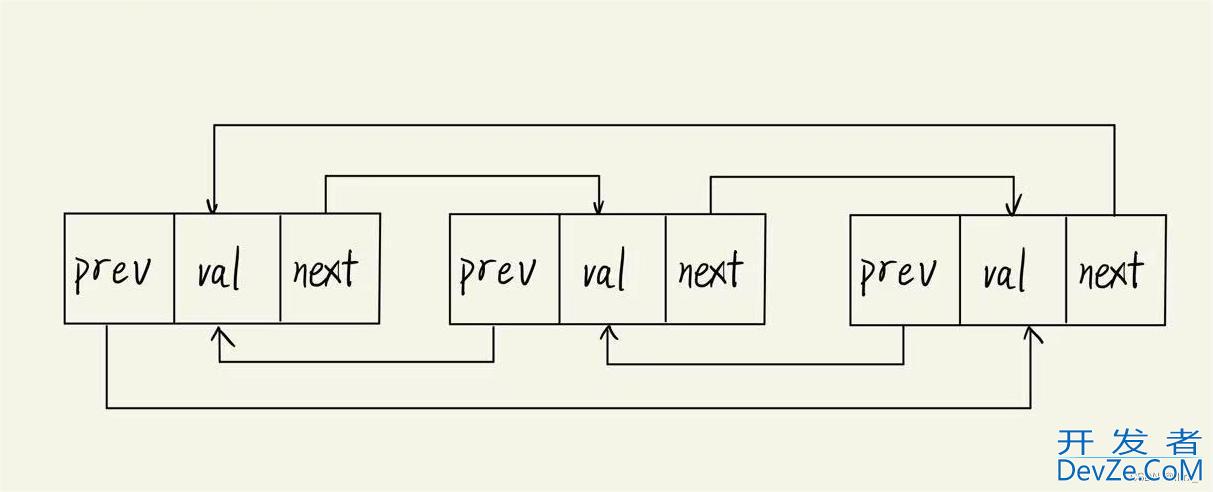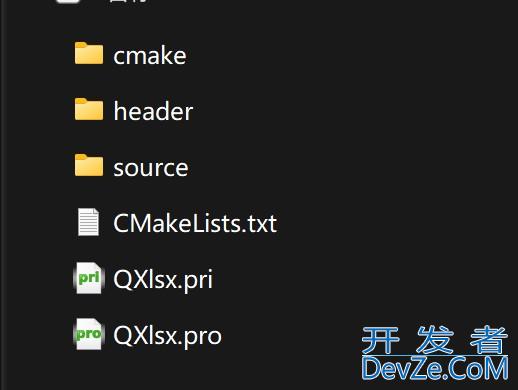C++双向链表的增删查改操作方法讲解
目录
- 一、什么是www.devze.com双链表
- 二、双链表功能函数
- 1、创建返回链表的头结点
- 2、双向链表打印
- 3、双向链表尾插
- 4、双向链表尾删
- 5、双向链表头插
- 6、双向链表头删
- 7、双向链表查找
- 8、双向链表在pos的前面进行插入
- 9、双向链表删除pos位置的节点
- 10、双向链表销毁
一、什么是双链表
双向链表也叫双链表,是链表的一种,它是单链表的升级版,与单链表不同的是,它的每个数据结点中都有两个指针,分别指向直接后继和直接前驱。而单链表只有一个指针,指向后继。
双链表示意图

首先创立一个结构体,其中包含一个prev指针,一个val值以及一个next指针。如图可以看出其中prev指针指向的是上一个结构体,而next指针指向的是下一个结构体。结构体代码
typedef int LTDataType;
typedef struct ListNode
{
LTDataType _data;
struct ListNode* _next;
struct ListNode* _prev;
}ListNode;
二、双链表功能函数
1、创建返回链表的头结点
ListNode* ListCreate()
{
ListNode* guard = (ListNode*)malloc(sizeof(ListNode));
if (guard == NULL)
{
perror("ListCreate");
exit(-1);
}
guard->_next = guard;
guard->_prev = guard;
return guard;
}
2、双向链表打印
void ListPrint(ListNode* pHead)
{
assert(pHead);
ListNode* cur = pHead;
while (cur->_next != pHead)
{
cur = cur->_next;
printf("%d->", cur->_data);
}
printf("NULL\n");
return;
}
3、双向链表尾插
void ListPushBack(ListNode* pHead, LTDataType x)
{
ListNode* newnode = (ListNode*)malloc(sizeof(ListNode));
if (newnode == NULL)
{
开发者_自学开发perror("ListPushBack");
exit(-1);
}
newnode->_data = x;
ListNode* cur = pHead->_prev;
newnode->_next = pHead;
newnode->_prev = cur;
cur->_next = newnode;
pHead->_prev = newnode;
return;
}
4、双向链表尾删
void ListPopBack(ListNode* pHead)
{
assert(pHead);
ListNode* pre = pHead->_prev->_prev;
free(pHead->_prev);
pre->_next = pHead;
pHead->_prev = pre;
return;
}
5、双向链表头插
void ListPushFront(ListNode* pHead, LTDataType x)
{
assert(pHead);
ListNode* newnode = (ListNode*)malloc(sizeof(ListNode));
if (newnode == NULL)
{
perror("ListPushFront");
exit(-1);
}
newnode->_data = x;
newnode->_next = pHead->_next;
newnode->_prev = pHead;
pHead->_next = newnode;
newnode->_next->_ppythonrev = newnode;
return;
}
6、双向链表头删
void ListPopFront(ListNode* pHead)
{
assert(pHead);
ListNode* cur = pHead->_next->_nextpython;
free(pHead->_next);
pHead->_next = cur;
cur->_prev = pHead;
return;
}
7、双向链表查找
ListNode* ListFind(ListNode* pHead, LTDataType x)
{
assert(pHead);
ListNode* cur = pHead;
while (cur->_next != pHead)
{
cur = cur->_next;
if (cur->_data == x)
return cur;
}
printf("Can't find.\n");
return NULL;
}
8、双向链表在pos的前面进行插入
void ListInsert(ListNode* pos, LTDataType x)
{
assert(pos);
ListNode* newnode = (ListNode*)malloc(sizeof(ListNode));
if (newnode == NULL)
{
perror("ListPushFront");
exit(-1);
}
ListNode* cur = pos->_prev;
newnode->_next = pos;
newnode->_prev = cur;
pos->_prev = newnode;
cur->_next = newnode;
return;
}
9、双向链表删除pos位置的节点
void ListErase(ListNode* pos)
{
ListNode* front = pos->_prev;
ListNode* behind = pos->_next;
free(pos);
front->_next = behind;
behind->_prev = front;
return;
}
10、双向链表销毁
void ListDestory(ListNode* pHead)
{
assert(pHead);
while (pHead->_next != pHead)
{
pHead->_next = pHead->_next->_next;
free(pHead->_next->_pr编程客栈ev);
pHead->_next->_prev = pHead;
}
retpythonurn;
}
到此这篇关于C++双向链表的增删查改操作方法讲解的文章就介绍到这了,更多相关C++双向链表的增删查改内容请搜索我们以前的文章或继续浏览下面的相关文章希望大家以后多多支持我们!






 加载中,请稍侯......
加载中,请稍侯......
精彩评论